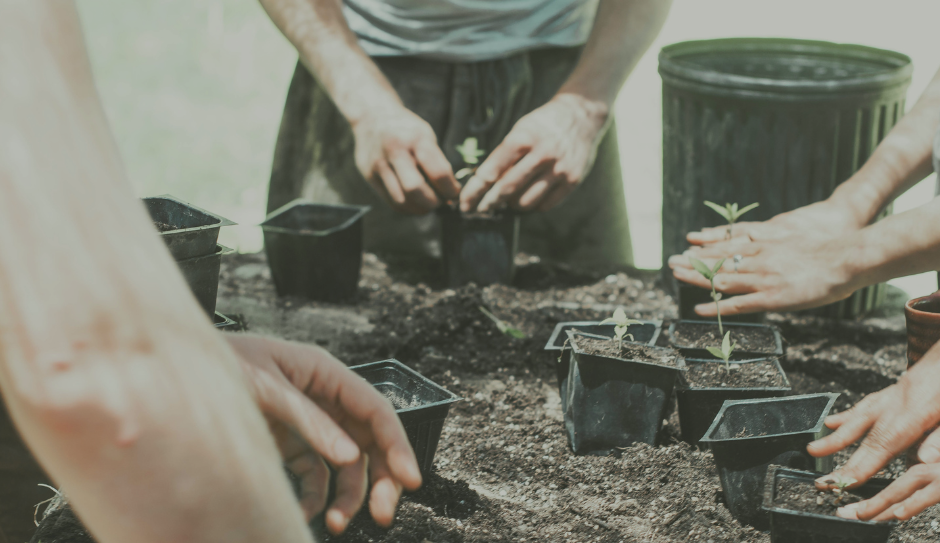Living off-grid is a lifestyle many people dream of, offering the chance to escape modern-day conveniences and embrace self-sufficiency. But making the leap from the conventional world to a life powered by renewable energy and sustained by your own hands requires preparation and the right knowledge. Whether you’re planning to live in a remote area or just looking to reduce your reliance on public utilities, learning the skills to thrive off-grid is crucial.
Thankfully, there are plenty of ways you can learn how to live off-grid. You can read books, take online courses, or gain hands-on experiences in eco-communities or volunteer programs. Exploring these options will help you gain the practical skills and understanding needed to create your own sustainable, off-grid lifestyle. In this guide, discover the different ways you can start learning today and build the confidence to go off-grid successfully.
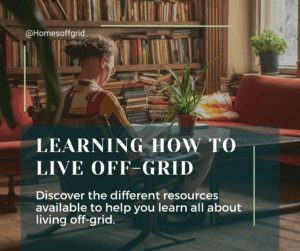
Books and Online Resources
Essential Books for Off-Grid Living
When it comes to learning about off-grid living, books can be one of the most valuable resources, providing you with comprehensive, practical knowledge on everything from building sustainable homes to growing your own food. You also don’t need battery power or internet to read a physical book. Whether you’re a beginner or already partway through your off-grid journey, these books could be extremely helpful.
One must-read is “The New Complete Book of Self-Sufficiency: The Classic Guide for Realists and Dreamers“ by John Seymour. This timeless classic covers nearly every aspect of off-grid living, from cultivating land and raising animals, to preserving food and generating renewable energy. It’s perfect if you’re seeking an all-in-one resource to start building your sustainable lifestyle.
If you’re looking to learn more about growing your own food, “RHS Gardening through the Year: Month-by-Month Planning Instructions and Inspiration“ by Ian Spence is an excellent guide. This book breaks down gardening tasks by month, giving you practical instructions and inspiration for creating a productive garden no matter what the season. It’s a great resource whether you’re managing a large plot or a smaller garden space.
Books like these can provide you with tried-and-tested advice from experienced authors, helping you to build up your knowledge as you embark on your off-grid journey.
Online Blogs, Videos, and Forums
In addition to books, the internet is filled with free resources that can help you learn how to live off-grid, including this website! Blogs, YouTube channels, and forums are full of real-life experiences, tips, and advice from people who have already made the transition. The important thing is to sift out the bad information and find the reliable resources.
For example, Off Grid World is a well-known blog that covers a wide range of topics related to off-grid living, including energy generation, sustainable housing, and permaculture. It’s a great place to start if you’re looking for practical tips and inspiring stories of people living independently.
Video blogs and YouTube channels are another excellent way to learn off-grid living through visual tutorials and first-hand experiences. Channels like Martijn Doolaard, which documents his journey of converting a remote Italian cabin, or The Off Grid Family, which explores various DIY projects and survival tips, offer plenty of insight into the realities of off-grid life. You can follow along as they show you the steps they’ve taken to achieve self-sufficiency and sustainability.
If you’re looking to connect with others who are on the same path, online forums are invaluable. The Off the Grid Forum is a great space where you can ask questions, share experiences, and get advice from a community of like-minded individuals. Whether you’re troubleshooting a specific problem or just looking for inspiration, forums like this provide a supportive environment to help you learn. Just remember to fact-check and remember that some people might not share the most accurate information, so do additional research.
Workshops and Courses about Off-Grid Life
In-Person Workshops
Learning about off-grid living isn’t just about reading and watching – it’s also about getting hands-on experience. Attending in-person workshops can give you the practical skills needed to live sustainably, whether that’s installing a solar system, building your own water harvesting setup, or learning about self-sufficient food production. These workshops allow you to immerse yourself in the off-grid lifestyle while gaining confidence through real-world practice.
For example, the Coastal Survival School, which now also runs the Human Animal project, offers courses focusing on survival skills in coastal and inland environments, teaching you how to live off-grid and off the land. It’s ideal if you’re interested in blending off-grid living with wilderness survival techniques.
Workshops at places like Mantel Farm provide practical skills for everyday off-grid living, such as their beekeeping or solar system-building workshops. It’s perfect for those looking to gain hands-on experience in generating renewable energy and keeping animals.
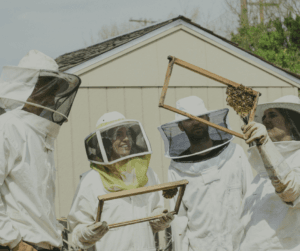
If you’re interested in creating or living in an ecovillage, Gaia Education offers the Ecovillage Design Education course around the world. This course helps you design sustainable communities, incorporating everything from renewable energy systems to eco-friendly buildings and permaculture landscapes.
You may also find useful workshops closer to home, often hosted by local colleges, councils, or environmental agencies. These could cover a variety of topics including gardening, animal husbandry, forest skills, and other sustainable practices. Check local listings to see what’s available in your area.
Online Courses and Certifications
If you prefer to learn at your own pace or can’t attend in-person workshops, online courses offer a flexible alternative. With a wide range of topics, from permaculture to renewable energy systems, you can build your knowledge of off-grid essentials from the comfort of your home.
For example, Strohplatz offers a ‘Self-Sufficient Off-Grid’ course, ideal if you’re seeking a comprehensive overview of how to transition to an off-grid lifestyle. Another great resource is Free Permaculture, which offers free courses, including a yearlong course that covers permaculture design and sustainable living practices!
If you’re looking for a more formal, certified course, ACS Distance Education is one of the oldest distance learning schools and offers a variety of courses on topics like permaculture, agriculture, and environmental management. These certified courses are perfect if you want to add credibility to your skills or start a professional path in sustainable living.
Online courses allow you to dive into specific subjects at your own pace, whether you’re looking to brush up on a particular skill or want a deep dive into an area like permaculture or off-grid energy systems.
Attending Off-Grid Festivals or Events
Another excellent way to immerse yourself in the off-grid lifestyle is by attending festivals and events that focus on sustainable living. These gatherings bring together like-minded individuals, experts, and enthusiasts, offering the perfect opportunity to learn, share experiences, and network. They often feature workshops, talks, and demonstrations covering a wide range of off-grid topics, from renewable energy to permaculture, making them an invaluable resource for anyone interested in this lifestyle.
For example, the Green Gathering is a UK-based event focused on sustainability, showcasing alternative energy systems, permaculture practices, and eco-friendly products. It offers hands-on workshops, talks, and even music, making it an engaging and educational experience.
Similarly, the Off-Grid Living Festival in Australia brings together off-grid enthusiasts from across the globe. This event features practical demonstrations, stalls with eco-friendly products, and opportunities to learn from those living off-grid.
In addition, some off-grid communities, like Tinker’s Bubble, host open days where you can explore the lifestyle firsthand. These events allow you to experience an established off-grid setting, gain practical insights, and engage with those who have already made the transition.
Attending these events is not just about learning – it’s also about building connections with others who share your passion for off-grid living. The people you meet and the advice you gather can provide inspiration and guidance as you embark on your own off-grid journey. Look for local festivals, open days, or eco-events in your area to deepen your knowledge and expand your off-grid network.
Volunteering and Internships
If you’re looking for a more immersive, long-term way to learn off-grid skills, volunteering and internships can provide invaluable hands-on experience. These opportunities allow you to live the off-grid lifestyle while gaining practical knowledge directly from experienced practitioners.
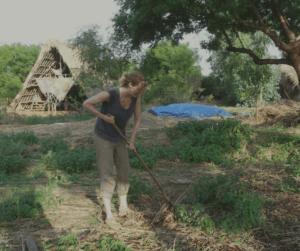
Work Exchanges
Work exchange websites are a fantastic way to get started. Platforms like WWOOF (World Wide Opportunities on Organic Farms), Helpx, and Workaway connect volunteers with organic farms, homesteads, and other independent off-grid projects. In exchange for a few hours of work per day, you’re provided with food and accommodation, allowing you to immerse yourself in sustainable living.
These opportunities can cover a wide range of activities, from building eco-friendly structures and tending gardens to maintaining water systems or learning about permaculture. The key is to ensure that the project aligns with your learning goals and that both you and the host have clear, shared expectations. Each project offers different types of work and learning opportunities, so it’s important to choose one that matches the off-grid skills you want to develop.
For example, if you’re interested in permaculture, look for hosts who prioritise regenerative agriculture. If you want to understand more about renewable energy, make sure to find a placement where those systems are in place.
Other Internship Programs
For a more structured learning experience, internships or volunteer programs at eco-communities and homesteads can be a great option. These placements are often designed to provide more in-depth training over a longer period, allowing you to focus on specific aspects of off-grid living.
At Sadhana Forest, for example, volunteers live in an off-grid community while contributing to environmental conservation and reforestation efforts. The programme offers an opportunity to learn about sustainable land management, water conservation, and community building in a hands-on, off-grid setting. There are sites in India, Haiti and Kenya so you can travel and explore at the same time.
Off Grid Organics offers both daily and residential volunteering opportunities. Here, you’ll learn about off-grid living, organic market gardening, and sustainable farming practices in a real-world environment. For a more immersive experience, you can volunteer long-term and become fully involved in the daily rhythm of life on the farm.
Meanwhile in Portugal, Keela Permaculture Farm offers the chance to volunteer for free or pay to join their permaculture internship. Both options allow you to learn about off-grid living while focusing on permaculture principles and holistic approaches to land management.
Volunteering or interning on a homestead or eco-community provides a direct, hands-on way to learn about sustainable living. Not only will you gain practical skills, but you’ll also be surrounded by a community of like-minded individuals who share your passion for living in harmony with nature.
Mentorship and Building a Support Network
Embarking on the off-grid journey can be both exhilarating and daunting. Having guidance and support can make a significant difference in your experience. Two essential components to consider are finding a mentor and building a supportive network.
Finding a Mentor
One of the most valuable resources you can have is a mentor who has firsthand experience living off-grid. A mentor can provide practical advice, share insights about the challenges you may face, and offer guidance based on their own experiences. This relationship can help you avoid common pitfalls and navigate the complexities of off-grid living more effectively.
Mentors can offer expertise in specific areas, such as renewable energy systems, permaculture practices, or sustainable building techniques. By learning from someone who has already taken the off-grid path you are considering, you gain not only knowledge but also confidence in your ability to succeed. Seek out local off-grid communities or networks, workshops, and online forums to find potential mentors who resonate with your values and goals.
Building a Support Network
In addition to finding a mentor, building a supportive network is crucial for your off-grid journey. Connecting with others who share your interests and aspirations can provide encouragement, resources, and a sense of belonging. You can exchange ideas, share experiences, and learn from one another as you navigate the challenges of off-grid living.
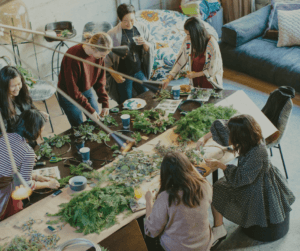
Consider joining local groups or online communities focused on sustainable living, such as Facebook groups, regional meetups, or dedicated forums. These platforms allow you to ask questions, seek advice, and share your progress with others on similar paths. Engaging with a community of like-minded individuals can inspire you. It can also provide a safety net of support when you encounter obstacles.
Participating in events such as workshops, farm tours, or eco-festivals can also help you connect with others who are passionate about off-grid living. These gatherings often foster friendships and collaborative opportunities that can enrich your experience and expand your knowledge base.
In summary, finding a mentor and building a support network can greatly enhance your off-grid learning journey. By surrounding yourself with experienced individuals and a community of peers, you’ll be better equipped to learn, grow, and thrive in your off-grid lifestyle.
Learning about Off-Grid Life from Experience
Learning how to live off-grid isn’t something that happens overnight. While books, courses, and mentorship are all valuable resources, there’s no substitute for hands-on experience. The process of trial and error will be one of your greatest teachers, helping you refine your skills and adapt to challenges as they arise.
Starting Small
It’s easy to feel overwhelmed by how much there is to learn about off-grid living, so it’s important to start small. Begin with manageable projects that allow you to develop your confidence and practical know-how. For example, you might start by building a simple solar system to power a small part of your home or try growing your own food in a small garden. These early steps will help you become familiar with off-grid systems without the pressure of running everything at once.
Starting small also allows you to learn the intricacies of each process at your own pace. You’ll gain valuable insight into what works for your situation – whether that’s finding the best crops for your climate or optimising your solar setup. The more you practice, the more confident you’ll become in your ability to manage the complexities of off-grid living.
Learning from Mistakes
Living off-grid requires adaptability and a willingness to learn from mistakes. No matter how much you prepare, challenges will arise – whether that’s a failed crop, a malfunctioning solar panel, or an unforeseen issue with water collection. The key is to approach these setbacks as opportunities for growth rather than as failures.
The ability to troubleshoot problems as they arise is one of the most valuable skills you’ll develop. Off-grid living demands resilience and patience, but with each mistake, you’ll get better at finding creative solutions. Remember, no off-grid system is perfect right from the start. It’s through trial and error that you’ll learn what works best for your specific needs, property, and goals.
Ultimately, personal experience will be your best guide. By embracing a mindset of continuous learning, you’ll become more self-sufficient and capable of handling whatever challenges come your way.
Conclusion
Learning how to live off-grid is a journey that involves a blend of theory, practice, and personal experience. From delving into informative books to participating in hands-on workshops, work exchanges, and even mentorships, there are countless ways to build the knowledge and skills you need for this lifestyle. You’ll find inspiration in online communities, and through trial and error, you’ll gain the confidence that only comes with direct involvement.
Each step you take brings you closer to a more self-sufficient, sustainable way of life. Whether you’re starting small with a personal project or diving into immersive learning experiences, there’s no one right way to begin. The key is to explore the options that best align with your lifestyle, location, and learning preferences. With curiosity, patience, and persistence, you’ll find your own path to living off-grid.
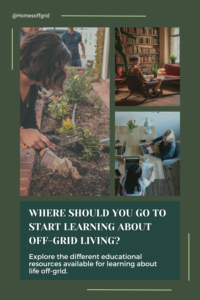
To find out more about off-grid living explore the Reading Room.
Disclosure: This post contains affiliate links. This means we receive a commission if you decide to purchase through our links, at no extra cost to you. We will only recommend products that we use and trust.


